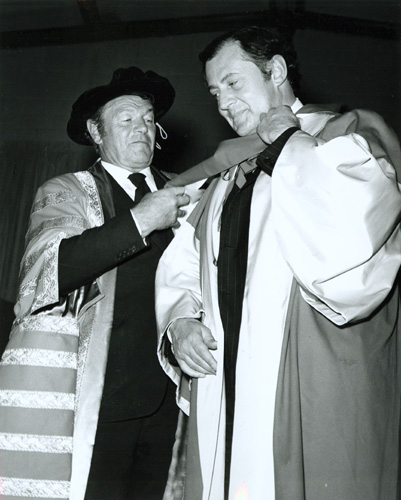1972 Fredericton Encaenia
Symons, Thomas Henry Bull
Doctor of Laws (LL.D.)
Orator: Condon, Thomas J.
Image Caption
L to R: Sir Max Aitken, Thomas Henry Bull Symons
Second Image Caption
Source: PR(5); Photo by Stone's Studio
Citation:
ENCAENIA, MAY, 1972
THOMAS HENRY BULL SYMONS
to be Doctor of Laws
Mr. Symons steps down at the end of this academic year as the first President and Vice-chancellor of Trent University. In the thirteen years that he has been at the helm, the foundations of a great university have been firmly established. We hope that his successors will be as determined as he has been to build for the future, resisting the crush of conformity that federal and provincial formulae, statistics, and numerical preoccupations can all too easily bring to our institutions of higher learning along with the needed dollars.
President Symons came to his new University from the University of Toronto when he was Dean of Devonshire House and a member of the History Department, having received his own education there and at Oxford University. Scholar and academic administrator, inveterate Board member and organization enthusiast, this dynamically quiet man puffs absently on his pipe and things happen -- a new university is launched, Canadian Studies are given a focus, local and provincial history receive expert treatment, and national issues are given thoughtful exploration in all the media. It is even said that Prime Ministers and would-be Prime Ministers seek his sage advice for he has not been wholly aloof from the great world of politics.
After a well earned sabbatical year in 1972-73 he must choose a new focus for the complex of interests and concerns that he has to date so magnificently managed. For what many men regard as a cap to their careers, Symons leaves at 42, the job well done. We shall hear more from this man; in what precise way we must leave to the future. But directions are discernible. A bridger of old and new, of tradition and innovation, his qualities of mind and man are urgently needed by country and his world. His beloved Trent is perhaps a Rosetta Stone. For in Trent we see not a Cambridge or Oxford on the Otonabee, as some have too facilely described it, but rather a dynamic bastion of the best of the past faced squarely on the intellectual problems of the present and the future, doing for Canada what its distinguished forebears have done for Britain. As Tom Symons faces the future we hope that he too continues to hue to the past and the present.
From: Honoris Causa - UA Case 70, Box 1
THOMAS HENRY BULL SYMONS
to be Doctor of Laws
Mr. Symons steps down at the end of this academic year as the first President and Vice-chancellor of Trent University. In the thirteen years that he has been at the helm, the foundations of a great university have been firmly established. We hope that his successors will be as determined as he has been to build for the future, resisting the crush of conformity that federal and provincial formulae, statistics, and numerical preoccupations can all too easily bring to our institutions of higher learning along with the needed dollars.
President Symons came to his new University from the University of Toronto when he was Dean of Devonshire House and a member of the History Department, having received his own education there and at Oxford University. Scholar and academic administrator, inveterate Board member and organization enthusiast, this dynamically quiet man puffs absently on his pipe and things happen -- a new university is launched, Canadian Studies are given a focus, local and provincial history receive expert treatment, and national issues are given thoughtful exploration in all the media. It is even said that Prime Ministers and would-be Prime Ministers seek his sage advice for he has not been wholly aloof from the great world of politics.
After a well earned sabbatical year in 1972-73 he must choose a new focus for the complex of interests and concerns that he has to date so magnificently managed. For what many men regard as a cap to their careers, Symons leaves at 42, the job well done. We shall hear more from this man; in what precise way we must leave to the future. But directions are discernible. A bridger of old and new, of tradition and innovation, his qualities of mind and man are urgently needed by country and his world. His beloved Trent is perhaps a Rosetta Stone. For in Trent we see not a Cambridge or Oxford on the Otonabee, as some have too facilely described it, but rather a dynamic bastion of the best of the past faced squarely on the intellectual problems of the present and the future, doing for Canada what its distinguished forebears have done for Britain. As Tom Symons faces the future we hope that he too continues to hue to the past and the present.
From: Honoris Causa - UA Case 70, Box 1
Citations may be reproduced for research purposes only. Publication in whole or in part requires written permission from the author.
